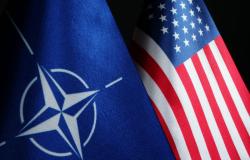Smart Take | Baltimore Bridge Collapse: A Wake-Up Call for America to Upgrade its Maritime Strategy
In the aftermath of the collapse of the Francis Scott Key Bridge in Baltimore, engineers are reviewing the safety of America’s infrastructure and economists are trying to fully understand the economic impact. Mark Kennedy, Director of the Wahba Institute for Strategic Competition, asks even broader questions in response to the tragedy. He provides insight into the vulnerabilities of America’s maritime strategy, whether or not the pace of America’s shipbuilding is robust enough to remain competitive, and how US port infrastructure and management compares to that of its global competitors.
Video Transcript
Baltimore Bridge Collapse: A Wake-Up Call for America to Upgrade its Maritime Strategy
The collapse of the bridge in Baltimore highlights the importance of infrastructure and its impact on our economy. And the closure of the harbor in Baltimore will certainly have a near to medium term negative impact on Baltimore. But I think from a national perspective, the other ports along the East Coast will keep that from spreading to the United States.
But what would spread to United States is if we lost access to international ports during a time of geopolitical stress. In shipbuilding, a maritime administration contracts with a number of our European allies companies to make sure that we have ships during a time of need. But we really don't have anything similar when it comes to ports. China has three of the largest port administration companies that administer ports around the world.
Most of the other big port administrators are with countries that would be reticent to take sides during any conflict. We really just have a Danish company and a Filipino company that we could perhaps contract with in a similar way on ports as we do with ships through the maritime administration globally. China has over 90 ports outside of China where it has financial interests.
America has none.
China has a broad global shipping fleet. We don't….. Less than 1% of the ships in the world are US flag. When you look at shipbuilding, China produces over half the ships in the world--number one producer. America ranks 18th. What we do need, is a national maritime strategy that is comprehensive, addressing all the vulnerabilities that America faces.
Keep in mind that we are the largest importer in the world and the second largest exporter in the world. So America has a very significant need to make sure that the maritime sphere is secure, even during times of geopolitical stress.
Guest

Mark Kennedy
Hon. Mark Kennedy (US Congress, 2001-07 MN), Director of the Wilson Center’s Wahba Institute for Strategic Competition, also serves as an appointed Civic Leader supporting the Secretary of the Air Force, a Senior Fellow at CNA-Center for Naval Analyses and as President Emeritus of the University of Colorado. Kennedy is dedicated to strengthening America’s alliances, and the technology, trade, infrastructure, and energy foundations of its economic and global leadership. Mark applies experiences as a first-generation college graduate, corporate executive, presidentially appointed member of the Advisory Committee for Trade Policy and Negotiations, founder of the Economic Club of Minnesota and author of an Ivy League published book. He has engaged wide cross-sections of society in over 45 countries, including refugee camps, war zones, 50 military bases and three aircraft carriers at sea.
Read MoreHosted By

Wahba Institute for Strategic Competition
The Wahba Institute for Strategic Competition works to shape conversations and inspire meaningful action to strengthen technology, trade, infrastructure, and energy as part of American economic and global leadership that benefits the nation and the world. Read more










